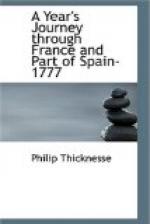A preacher holding forth in the place called Las Mancanas at Madrid, after informing his auditors of the sufferings of Jesus Christ, added,—and is it not strange, that we still continue to sin on, and live without repentance? O Lord God! said he, why sufferest thou such ungrateful and wretched sinners to live?—And instantly giving himself a violent box on the ear, the whole assembly followed his example, and four thousand soufflets were given and received in the twinkling of an eye.—The French Embassador, from whose memoires I take this story, was upon that instant bursting out in laughter at the pious ceremony, had he not been checked by one of his friends, who happened to stand near, and who assured him, that his rank and character would not have saved him, had he been so indiscreet, for the enraged populace would have cut him in a thousand pieces; whereupon he hid his face in his handkerchief, and boxed his own ears more for the love of himself than from gratitude to his Redeemer.
LETTER XXXII.
There are in Spain twelve councils of state, viz. of War, of Castile, of the Inquisition, of the royal orders of St. Iago, of Arragon, of the Indies, of the chamber of Castile, of the Croisade, of the State, of Italy, of the Finances and Treasure, and lastly, that (of no use) of Flanders.
The council of War is composed of experienced men of various orders, who are thought capable of advising upon that subject, and not of any determinate number.
That of Castile has a president and sixteen other members, beside a secretary and inferior officers; it is the first of all the councils, and takes cognizance of civil as well as criminal matters. The King calls this council only OUR council, to mark its superiority to all others. The president is a man of great authority, and is treated with the utmost respect; nor does he ever visit any body.
The council of the Inquisition, established by Don Fernando in 1483, has an inquisitor general for its president, who is always a Grandee of the first condition; he has six counsellors, who are called apostolic inquisitors. This court, (the power of which has, fortunately for mankind, been of late years greatly abridged) has a great number of inferior officers, as well as holy spies, all over the kingdom, particularly at Seville, Toledo, Valladolid, Barcelona, and other places, where these horrid tribunals are fixed; each is governed by three counsellors, who, however, are dependant on that of Madrid; and to whom they are obliged every month to give a particular account of what has passed through their hands. These men have not power to imprison a priest, a religious, nor even a gentleman, without obtaining the consent of the supreme court above; they meet at Madrid twice every day, and two of the King’s council always attend at the afternoon meeting.




